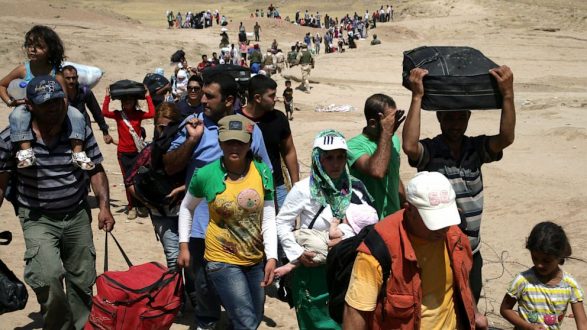US Officials Admit Concern Over Syrian Refugee Effort
Top U.S. counterterrorism officials say they worry a potential terrorist could be hiding among refugees who are looking to come to the United States after escaping the brutal war in Syria.
“It’s clearly a population of concern,” the director of the National Counterterrorism Center, Nicholas Rasmussen, told the House Homeland Security Committee on Wednesday.
Committee Chairman Mike McCaul, R-Texas, went further, saying it would be a “huge mistake” to bring refugees from the conflict to the U.S. – even as an estimated 4 million children, women and men have been forced to flee Syria and another 7 million have been displaced from their homes there, unable to leave.
Senior officials leading the State Department’s refugee efforts say the U.S. government has a long history of caring for the innocent victims of war.
“It’s not a matter of should we do it, it’s really a matter of how we do it,” Larry Bartlett, the State Department’s director of Refugee Admission for the Bureau of Population, Refugees and Migration, told ABC News. “One of the fundamental principles of our country is that we care about others. We will help others.”
Bartlett insisted every refugee is vetted through an “intensive” system, drawing on information and expertise from several U.S. intelligence agencies, including the Defense Department.
“We have a very slow process of moving refugees through our pipeline, and part of it is because of the security vetting component,” Bartlett said.
Homeland security officials also testified Wednesday that any potential refugees from Syria would receive “the most rigorous screening.”
rancis Taylor, the head of the Department of Homeland Security’s intelligence office.
Yet that’s not reassurance enough for McCaul and other leading Republicans, who recently penned a letter to National Security Advisor Susan Rice cautioning that the U.S. government’s ability to screen refugees from Syria might not be sufficient.
“The continued civil war and destabilization in Syria undeniably make it more difficult to acquire the information needed to conduct reliable threat assessments on specific refugees,” they wrote in the letter two weeks ago.
With tens of thousands of Syrians joining groups in the region like the Islamic State, the U.S. government “cannot allow the refugee process to become a backdoor for jihadists,” they added.
At the hearing Wednesday, an FBI official also questioned whether the U.S. intelligence community – with few assets on the ground in Syria and little insight into the country from elsewhere – can provide authorities with the information they need to properly determine whether any refugee could pose a threat.
“You have to have information to vet,” said FBI Assistant Director Michael Steinbach, who heads the bureau’s counterterrorism division. “Databases don’t [have] the information on those individuals, and that’s the concern.”
ABC NEWS

